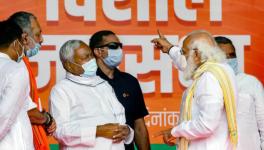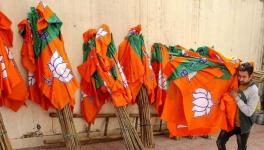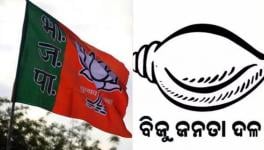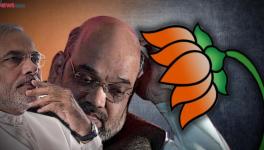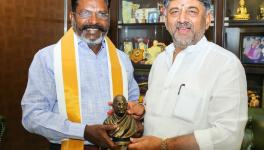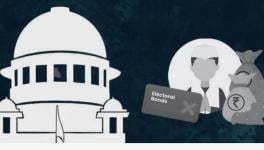Congress Dilemma and Anti-BJP Struggle in Kerala
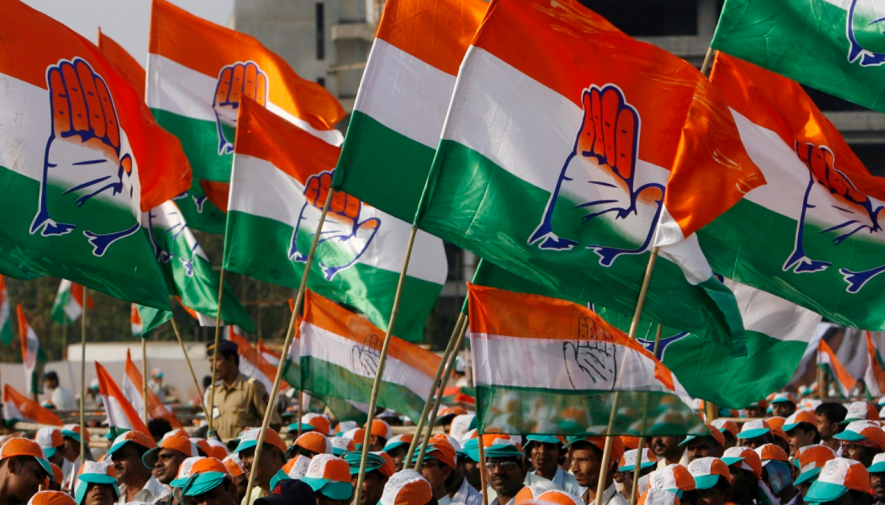
Representational Image. File Image
In Kerala's political landscape, a palpable sense of a 'haunting' spectre pervades the ranks of Congress leaders. The source of this spectral presence? An imminent invitation from the Bharatiya Janata Party (BJP) is casting a spell of uncertainty and introspection among some stalwarts in the Grand Old Party.
The defection of Padmaja Venugopal, the daughter prominent Congress leader K Karunakaran and earlier, Anil Antony, son of Congress veteran AK Antony, to the BJP has sent shockwaves through the United Democratic Front (UDF), fracturing its credibility and leaving its constituents grappling with doubts about their political allegiances. The spectre of Congress becoming a liability in the face of BJP's ascendance looms large, prompting soul-searching among party faithfuls.
For secularists, the imperative of unity against BJP is paramount, advocating for a coalition of non-BJP parties to field a maximum number of common candidates in constituencies where the saffron party holds sway. Such strategic manoeuvres serve as a rallying cry for the secular community, bolstering their resolve in the face of ideological opposition.
Yet, in Kerala's fiercely contested political arena, where the Left and Congress-led fronts vie for supremacy, the question of strategic voting assumes critical significance. Who should anti-BJP voters align with in their quest to thwart BJP's march to power? This conundrum underscores the complex dynamics at play as competing political formations jostle for the mantle of the anti-BJP vanguard.
At the national level, a narrative has emerged positing the Congress as the anchor of the Opposition anti-BJP front, drawing on historical precedence and ideological alignment. However, the disillusionment of many who bought into this narrative during the last Lok Sabha elections underscores the pitfalls of placing undue faith in such an electoral front. While some remain steadfast in their allegiance, others are beginning to question the efficacy of old paradigms in the face of evolving political realities.
As Kerala grapples with political uncertainty and ideological flux, the haunting spectre of strategic alliances and electoral calculus echoes through political circles. In this battle of competing interests and shifting allegiances, the fate of the anti-BJP struggle hangs in the balance.
It is a fact that in the intricate tapestry of Indian politics, the Left has emerged as a steadfast bastion against the rise of communalism and the BJP. Unlike other political parties, the Left's commitment to its ideological principles, coupled with its unwavering practical stance, renders it a dependable ally in the fight against divisive forces.
One pivotal moment that underscores the Left's unwavering stance occurred following the 2004 Lok Sabha elections. Despite BJP's hyped campaign of 'India Shining' during the Atal Bihari Vajpayee regime, the electorate delivered a clear message. The BJP ended up securing only 145 seats compared with Congress's 138. In this political landscape, the Communist party of India (Marxist), along with its Left Front allies, emerged victorious, clinching 44 seats in the Lok Sabha. This electoral success did not lead to opportunistic power negotiations; rather, it reinforced the Left's commitment to keeping BJP at bay.
When Congress nominated Manmohan Singh as its prime ministerial candidate, concerns arose regarding his involvement in implementing economic liberalisation policies. However, then Congress leader Sonia Gandhi's consultation with prominent Left leader Harkishen Singh Surjeet reassured them that their paramount objective was to thwart BJP's ascent to power. Surjeet's assertion that the Congress could nominate any candidate for prime ministership as long as it aligned with the goal of preventing BJP's return to power exemplified the Left's pragmatic approach. Moreover, the CPI(M)'s proactive role in rallying other political entities under a unified front (United Progressive Alliance) showcased its dedication to upholding national sovereignty and addressing public grievances within the constraints of coalition governance.
This pragmatic stance is not a novelty for the Left. Historical precedents, such as the stance taken during former Prime Minister VP Singh's tenure, where the Left's resolute opposition to communalism garnered praise, further solidified its reputation as a consistent bulwark against divisive forces.
In essence, the Left's unwavering commitment to anti-communalism and its pragmatic approach to coalition politics have positioned it as a reliable ally in safeguarding India's secular fabric. Its ability to transcend power dynamics in favour of overarching principles underscores its indispensability in preserving the country's democratic ethos.
In the complex political landscape of India, the clarity of ideological and political positions holds paramount importance. Amidst turbulent waves of governmental measures and societal shifts, the Left in India has emerged as a steadfast advocate for constitutional integrity and social justice, particularly in the face of the Narendra Modi government's policies.
The principled stance taken by the Left against the Citizenship Amendment Act (CAA) stands as a testament to their unwavering commitment to upholding constitutional values. Notably, it was the Left Democratic Front (LDF) government in Kerala that boldly declared its refusal to implement the controversial Act, setting a precedent for principled dissent. Also, CPI(M) general secretary Sitaram Yechury was the first to venture into Kashmir following the revocation of its special status (in August 2019) despite facing restrictive measures. This swift action underscored the Left's proactive approach to defending democratic norms.
Furthermore, the Left's resolute rejection of the Uniform Civil Code and the Ram Temple inauguration in Ayodhya exemplifies its steadfastness in safeguarding secular ideals. In contrast, the delayed response from Congress demonstrates a reluctance to confront contentious issues head-on, indicative of a wavering commitment to its professed principles.
The Congress's failure to stand in solidarity with victims of communal violence, such as in the case of Congress MP Ehsan Jaffrey, during the Gujarat 2002 violence, raises questions about its moral compass and accountability to the affected communities. In instances such as the Gujarat pogrom and the Bilkis Bano case, the conspicuous absence of the Congress further underscores its shortcomings in addressing human rights violations and ensuring justice for marginalised communities. Conversely, the CPI(M)'s proactive engagement in legal battles, including challenging the administration's actions in Delhi and opposing the electoral bonds scheme, demonstrates it unwavering commitment to democratic values and social justice.
Moreover, the contrast between the Left's proactive stance and the Congress's passive response underscores a broader pattern of ideological clarity versus ambiguity within Indian politics. This is particularly evident in instances where Congress has been accused of complacency or complicity in the face of communal violence and attacks on democratic institutions.
In conclusion, the Left's consistent adherence to its ideological principles and proactive engagement in defending constitutional values serves as a benchmark for political integrity in contemporary India. Conversely, Congress's vacillation and delayed responses raise concerns about its commitment to upholding democratic norms and social justice.
As India navigates its political landscape, the clarity and conviction of ideological positions will continue to shape its trajectory towards a more equitable and just society. In the ever-evolving landscape of Indian politics, the role and relevance of the Congress party have come under scrutiny, particularly in the context of the anti-BJP front. As Opposition parties coalesced under the banner of 'INDIA' bloc for the 2024 elections, the Congress found itself at the centre of attention, albeit for reasons that question its continuity within the coalition.
Pride swelled within Congress ranks following victories in Karnataka and Himachal Pradesh Assembly elections. However, the sense of triumph was swiftly overshadowed by actions that fractured the unity of Opposition parties in Rajasthan, Madhya Pradesh, and Chhattisgarh. The decision to forgo participation in the scheduled INDIA rally in Bhopal further underscored the party's disconnect with the prevailing national sentiment.
A stark reality emerges when one assesses the Congress' current political footprint. With power concentrated in only three states, including Himachal Pradesh, which holds a mere four Lok Sabha seats, the party's influence outside South India appears tenuous. The recent upheaval following the Rajya Sabha elections in Himachal Pradesh further exemplifies the administrative challenges plaguing the party.
In the southern state, where BJP does not pose a significant electoral threat, Congress's dominance on the anti-BJP front is notably absent. Its stronghold remains limited to states contributing approximately 120 seats, with the party managing to secure victory in just 15 seats during the last elections. The narrative of the Congress emerging as the party with the largest seat share in Kerala, as witnessed in the 2019 campaign, seems to be losing relevance, with Rahul Gandhi's decision to contest from Wayanad being seen as a vote of ‘no confidence’ within the INDIA coalition.
Shifting allegiances within the political spectrum further compound the Congress's woes. The possibility of senior Congress leaders defecting to the BJP at any given moment has eroded confidence within the secular community in Kerala. Recent defections, including that of AK Antony's son and Padmaja Venugopal, only serve to underscore the precarious state of the party.
As the nation braces for yet another electoral showdown, the efficacy of the anti-BJP front hinges on strategic alliances and unwavering commitment. In this calculus, the trustworthiness of LDF MPs vis-à-vis Congress MPs in upholding the anti-BJP agenda remains a pressing concern, underscoring the fluidity and complexity of India's political landscape.
The writer is a professional engineer based in Kerala. The views are personal.
Get the latest reports & analysis with people's perspective on Protests, movements & deep analytical videos, discussions of the current affairs in your Telegram app. Subscribe to NewsClick's Telegram channel & get Real-Time updates on stories, as they get published on our website.









